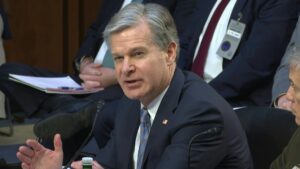NC Dems Plead for Cash as Beasley Deadlocked With GOP Opponent in Decisive US Senate Race
Democrats in North Carolina want party leaders and outside groups to devote more resources to the state’s neck-and-neck U.S. Senate contest, arguing that it presents one of the best opportunities to flip a GOP-held seat in the fast-approaching midterm elections.
“It’s a year where we have a great candidate, and I think the national Democrats are making a big mistake if they’re not paying attention to North Carolina,” Bruce Thompson, a veteran Democratic consultant in the state, told The Hill on Wednesday.
Democratic Senate nominee Cheri Beasley has a one-point lead over U.S. Rep. Ted Budd (R-N.C.) in the race to succeed retiring Republican Sen. Richard Burr, according to a survey released last week by Civiqs.
The poll showed that 49% of likely voters support Beasley, a former state Supreme Court Chief Justice, while 48% back Budd—a 2020 election denier who, like many swing-state candidates endorsed by former President Donald Trump, has refused to commit to accepting 2022 election results. The narrow gap separating the two nominees is well within the margin of error.
Although “Beasley has maintained a yawning cash advantage over Budd,” The Hill reported, “spending from Democratic groups pales in comparison to the money that Republicans are pumping into the race.”
According to the news outlet:
The Senate Leadership Fund, a super PAC aligned with Senate Minority Leader Mitch McConnell (R-Ky.), has already reserved more than $27 million in ads to boost Budd through Election Day.
Democrats are also bracing for a fresh wave of Republican spending from MAGA Inc., a new super PAC created by allies of Donald Trump that will back GOP candidates like Budd who were endorsed by the former president in their primaries.
By contrast, the Senate Majority PAC, a super PAC aligned with Senate Majority Leader Chuck Schumer (D-N.Y.), on Tuesday revealed a $2 million ad campaign in North Carolina, which follows an earlier seven-figure investment in the state.
Women Vote, the independent spending arm of Democratic fundraising machine EMILY’s List, also pumped $2.7 million into North Carolina to spotlight Beasley’s support for abortion rights, which are in jeopardy of being eliminated nationwide by right-wing lawmakers such as Budd, who is a co-sponsor of Sen. Lindsey Graham’s (R-S.C.) federal abortion ban legislation.
But as The Hill noted, “strategists and political operatives lament that the race has largely flown under the radar for national Democrats and are warning against squandering an opportunity in a state that has repeatedly proven competitive—yet ultimately elusive—for the party in recent years.”
A victory by Beasley in North Carolina’s pivotal contest could help the Democratic Party retain, and possibly expand, its razor-thin majority in the Senate.
Elsewhere in key battleground states, U.S. Rep. Tim Ryan (D-Ohio) maintains a slim advantage over Trump-backed Republican nominee J.D. Vance—another GOP candidate who has refused to commit to accepting 2022 election results—leading him by three points in the race for the Ohio Senate seat being vacated by Republican Sen. Rob Portman.
Wisconsin Lt. Gov. Mandela Barnes (D) is now down by one point to incumbent Republican Sen. Ron Johnson after jumping out to a seven-point lead last month.
In Florida, Democratic U.S. Rep. Val Demings has reduced incumbent Republican Sen. Marco Rubio’s lead from 49%-41% in January to 45%-41% as of last week.
Polls indicate Pennsylvania Lt. Gov. John Fetterman is the Democratic nominee with the best chance to flip a Senate seat on November 8. Fetterman is currently enjoying a double-digit lead over GOP nominee Dr. Mehmet Oz—a super-wealthy, right-wing celebrity television doctor backed by Trump—in the race to replace retiring Republican Sen. Pat Toomey.
Control of the Senate will also depend on the outcomes of several hotly contested races featuring incumbent Democratic senators. That includes Mark Kelly in Arizona, Raphael Warnock in Georgia, Catherine Cortez Masto in Nevada, and Maggie Hassan in New Hampshire.
Originally published at Commondreams.org.











